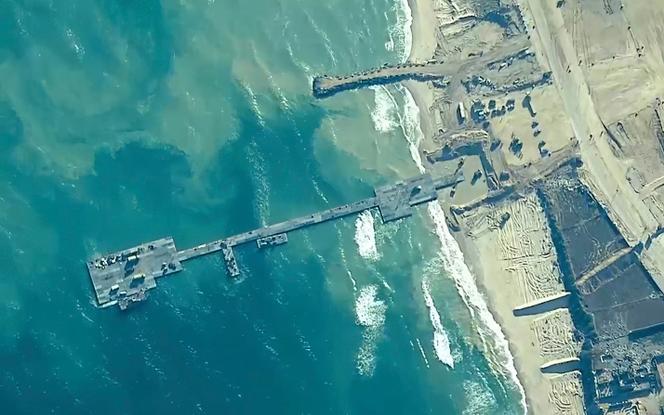


The collapse of American credibility in the Middle East is unprecedented in the ninth month of the Gaza war. Not only has the US failed to mobilize for the two-state solution it is supposed to be calling for, it has not even been able to secure a lasting ceasefire, despite the personal commitment of President Joe Biden and eight unsuccessful tours of the region by US Secretary of State Antony Blinken.
Nor has Washington been able to convince Israel to let enough humanitarian aid into Gaza to alleviate the suffering of the population. And the temporary pier built by the US army on Gaza's coastline has proven to be a resounding fiasco in terms of assistance to the most vulnerable civilians.
Yet Biden chose the solemn occasion of his State of the Union address on March 7 to launch the initiative: "I’m directing the US military to lead an emergency mission to establish a temporary pier in the Mediterranean on the Gaza coast that can receive large ships carrying food, water, medicine and temporary shelters." While promising that "no US boots will be on the ground," the president pledged to ensure "a massive increase in the amount of humanitarian assistance getting into Gaza every day." Specialists in the field, including within the Biden administration, have serious doubts about the viability of the project. As for humanitarian organizations, they point out that only Israel's unblocking of land access to Gaza can halt the spread of hunger and epidemics in a population literally on its last legs.
The White House, stuck in its narrow "anti-terrorist" vision of the conflict in Gaza, is nevertheless convinced that it has found the ideal methods to circumvent the diktats of the Israeli military, which has thus preserved its total freedom in its fight against Hamas while aid is transported by sea from Cyprus. The exorbitant cost of this "temporary landing jetty," in the region of €300 million, is in line with the US's "anti-terrorist" operations in Afghanistan and Iraq, whose "civilian" aspects were accompanied by lucrative contracts for US companies, without any benefit for the local population. The process of installing this jetty has proved so cumbersome and complex that it took more than two months after the presidential announcement before it was finally operational on May 17. Such delays are simply unjustifiable given the urgency of the humanitarian catastrophe, which has only been exacerbated by the offensive on Rafah launched by Israel on May 6, despite the "red line" drawn by Biden.
You have 50.54% of this article left to read. The rest is for subscribers only.
